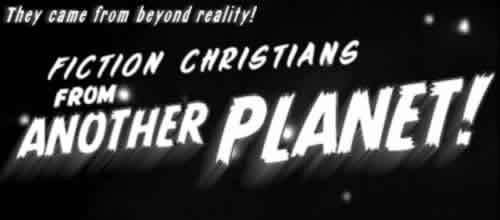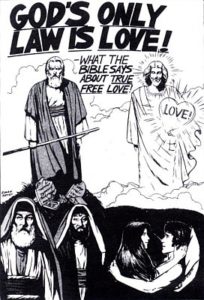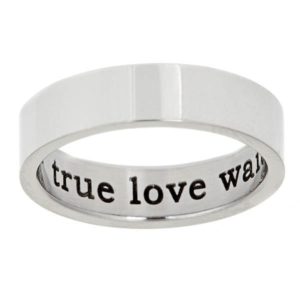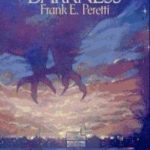Fiction Christians From Another Planet! VI: Alien Love Slaves
Based on many Christian novels, you’d think their authors were chronically, willfully single midlife-crisis adults who had never once experienced or committed lifelong to true love. But that’s not the case. Almost every Christian author been happily married for years.
So how come many authors’ fictionalized love stories are so bleeding-heart terrible?

I don’t like standalone romance. It’s coarse, and rough, and irritating, and it gets ehverywhere.
Certainly this applies to the dominant “romance” genres on Christian bookstore shelves (cozy romance, historical romance, contemporary romance, short-story romance, overly-angst-ridden romance, love-triangle romance, contemporary cozy historical romance, etc.).
Let’s briefly address all those dominant adjective-romance genres. Yes, this is Speculative Faith, and not a mainstream-fiction site. But it also helps to survey our (friendly) enemy.
First you might of course join me in opposing the very notion of romance as a separate genre. No one writes or publishes fiction focusing only on how one joins a local church, has children, or advances in careers; we don’t have “cozy motherhood” novels or “historical local church” genres. All these are subsets of real life — our greater stories. So is romance.
Second, what about all those classic works too often viewed as “romance”? Start with, of course, Pride and Prejudice. Anyone who applies a “historical romance” label to that classic deserves a two-hour lecture from a dry literature professor. That classic is not romance. It includes many other facets: then-contemporary social criticism, human relationships and conflicts, family cultures (and cults), and much more. Yes, there’s romance in it, and a fine romance too, but that along with other “genres” are means to other ends. Just as in real life.
There, genre criticism done. Now what if romance-as-genre were abolished? I fear we’d still have the same problems of badly written love stories. Why? Because I have endured them in many Christian speculative novels as well. No, not romance-alone books, not mainstream stuff — and not in badly written books. These are otherwise fine, upstanding stories that I did enjoy reading and may recommend. But their love-story subplots are simply strange.
No, I can’t name names here; I’ll get in trouble.
 This bizarre species of Christian-fiction alien love slaves comes in two mutations:
This bizarre species of Christian-fiction alien love slaves comes in two mutations:
- Fatalistic romance. Two characters are so obviously “meant for each other” that the fictional universe itself favors that axiom. So fate arranges “coincidental” events such as mutual quests, chance meetings, and perhaps the ever-popular “stuck in a cabin during a snowstorm” setup. It’s a whimsical concept that makes for great animated shorts. But when this forms the music of fiction, much more so every love-story fiction, it’s dull and discordant. Here we find no element of surprise, no free choice, nothing like true love.
- Free-willie romance. Against every clear fact, authors keep trying to pretend that two characters so clearly can’t Be Together, and are silly enough to think readers will accept the farce. Thus characters make stupid free-will decisions that make no sense for real human beings (even stupid ones). Their only goal is to draw out the story needlessly. So here there’s not even a hidden sense of the clarity that does often accompany true love.
Why these two absurdist approaches to romantic subplots, especially from novelists who have been married for a while and should presumably know better? I’ve given a great big hint for the first possible diagnosis in those two emboldened terms above:
1. Authors misunderstand the character of God and nature of His love.
 This is the prime divine mover behind all bad romance: if you don’t believe in Biblical truth about God and His love, you’ll have skewed views of all love. And mutilating the truth that “God is love” is a cottage industry among many evangelicals. No, I’m not only talking about Rob Bell and other universalist authors. Popular and otherwise good teachers have already wrongly taught of “God’s love” far past the point of parody. I don’t believe they think God’s love does not mean that He isn’t holy, hateful of sin, or willing to pour His wrath on Christ in our place. But many do prefer simply not to talk about such things very often. And of course, “we don’t talk about that truth” soon becomes “we don’t really believe that truth.”
This is the prime divine mover behind all bad romance: if you don’t believe in Biblical truth about God and His love, you’ll have skewed views of all love. And mutilating the truth that “God is love” is a cottage industry among many evangelicals. No, I’m not only talking about Rob Bell and other universalist authors. Popular and otherwise good teachers have already wrongly taught of “God’s love” far past the point of parody. I don’t believe they think God’s love does not mean that He isn’t holy, hateful of sin, or willing to pour His wrath on Christ in our place. But many do prefer simply not to talk about such things very often. And of course, “we don’t talk about that truth” soon becomes “we don’t really believe that truth.”
That’s how we get both romance extremes, the fatalistic and free-willie strains.
The free-willie strain is easier to explain: most evangelicals posit a loving God Who, they must conclude, is ultimately overruled (of His own volition) when it comes to our free will. Why then should a fictional romance have any direction, clarity, or maturity in Christ?

People’s desperation for some kind of sovereignty (even fatalism) is also why the anti-Biblical “no rules, just freedom” approach will inevitably lead people right back into legalistic slavery.
So what could lead to the fatalism? Because people instinctively suspect that they somehow must “make up for” a lack of teaching about God’s sovereignty. Instead of basing belief in Scripture, though, they grab for humanistic notions of “fate.” They miss the equally Biblical truth that humans make meaningful choices, and within the parameters of our natures.
2. Authors draw from romantic clichés rather than their own stories.
This part confuses me. Everyone knows the slogan “write what you know,” which applies to writing about the kinds of people authors know even if they’ve never been to, say, Neptune. So why do romantic authors redirect that into “write what you know about other people’s romantic fiction” rather than “write what you know about your story”? That’s how we get the absurd stuff: overblown love triangles, needless angst, and choreographed situations.
If you’re an author and aren’t convinced, I’ll clinch the argument: this is what George “I Don’t Like Sand” Lucas did. Do you really want to follow in his footsteps?
So why might authors do that?
3. For some reason, authors may assume their own romances are abnormal.

What if you didn’t “wait”? Can God not redeem your real-life love story?
Maybe some writers’ stories are abnormal — which is why we get major-motion-picture-style revisionist “romance.” But what about a Christian author who’s been happily married for years? Surely her love story is relatively rational, but she’s somehow concluded it was not worth using as a reference foundation for fiction. I can only suggest a few reasons why:
- Another evangelical cottage industry is the “you only know your true love after God fatalistically guides you to him/her” school. (See also: Voices From Beyond.) This is often mixed with the “true love waits” ideal. Many, perhaps wrongly, assume that ideal means “do it right the first time, or else your romance is subpar.” Might some Christian authors feel their own love-story experiences don’t conform to those idealistic notions?
- With or without that suspicion, authors simply assume their own love stories are just not as sexy as the fatalistic or free-willie clichéd stuff we get on the movies and TV. So real-life relationships, confusions, and even clarity are thrown out for the clichés.
For those reasons and others, the romantic myths continue. Characters act in unsurprising and dull ways as they fatalistically “fall in love,” or else make absurd free choices foreign to reality and only home to “pop romance” storylines meant to prolong the Agonizing Angst.
That stinks, and I don’t like it.
Solutions?
These are simple, so my list is limited.
- Everyone: let’s base our beliefs about any love first in Biblical truth of God’s love.
- Readers: find stories that don’t commit the above sins. Authors: write more of them.










































Then there are those of us who don’t have their own love story, and have no idea how to write one due to a lack of personal experience. That is likely why any I’d try to write would end up badly. Unfortunately, it’s also a major motivation in my current novel, so I’ll keep these in mind.
Kaleb: I was in your shoes at one point. So I read books with romantic elements that really appealed to me. Even if you have no experience, you know what kind of story appeals to you. Aragorn/Arwen? Elizabeth/Mr. Darcy? Han/Leia?
Once you’ve picked one that really resonates with you, pick it apart and look at how the characters interact and how their relationship ends up. Then use similar emotional motivations with your own characters. Years later, you’ll reread it and freak yourself out at how accurate you were. 🙂
I will have to do that, I think, even as much as I generally dislike romance. I’ll just have to think of it as a psychology experiment to manage to get through it.
But hey, it’s an excuse to rewatch Star Wars and Indiana Jones.
There is an element that may be behind part of this dearth of believable, empathetic love stories. It is an aspect of writing that I had not considered until I began to spend more time around writers. Especially, I’m almost sorry to say, speculative fiction authors. Regardless of whether these authors are published or not…
SELF-CONSCIOUSNESS
It amazes me how many writers are uncomfortable when it comes to the very intimate task of looking themselves in the mirror. I know writers with wonderfully epic love stories that happened in their own lives–either to them, or to close family and friends–but when they sit down with a blank page, these writers suddenly develop Tourette’s and craft the most painful, stick-figured romances.
Yes, it is hard to write intimacy. One has to consider behaviors, and feelings, and human interaction, and this can be very overwhelming. That doesn’t mean short-cuts work better. CS Lewis wrote in The Four Loves: “Eros will have naked bodies; Friendship naked personalities.” A good love story does not require any characters to take off their clothes. Else Jane Austen would not still be in print. But it DOES require the author to expose the soul of the character in such a way that truth and grace and hope and need are very real. Real to both the reader and the character.
There is a vulnerability in this that I think a lot of us authors fear. It’s very hard to face the cold, cruel world and say “Love me, warts and all!” So we skip over the uncomfortable parts. Maybe we don’t confess our struggles with anger management. Or we turn a deaf ear when the preacher convicts us about our choices in music. Or we point at our neighbors and say “Thou shalt not be so self-righteous!” We’re not always honest with ourselves. Hence the psalmists plea “Search me, O God, and know my heart: try me, and know my thoughts.” We tend to shy away from parts of us that we know don’t measure up, so we need an Advocate to do the searching and exposing for us.
But where God is a wise and gentle father, the world is not. And I think that self-consciousness, that fear and pride, keep a lot of authors from communicating the wonder of God’s grace overcoming the messy parts of our lives. That’s not easy to control. And for many authors, having control of our fantasy world is a part of why we write. And until we let go of that control, giving God room to write the story in all its warts and wonder, our romances will stay thin and drawn. 🙂
Yes, I think you’re right. Self-consciousness is a really hard thing to deal with in writing.
Additional thought: good writers can do all they can to fix the problem, and yet the majority of Christian readers will flock to the cheap-trick “romances.” But apart from pointing to better stories that may “sell” themselves as well as can be expected, what can we as readers do to challenge and even discourage this behavior among those we know personally, and the evangelical/broader markets in general?
Well, not to get off-topic from the alien love slaves thing, but that comes back to the nature of fantasy. Fantasy is wish fulfilment. For fellas, this translates to superpowers and epic battles and discovering you’re not who you thought you were and that you can use your flaws as weapons against terrible foes. Heady stuff, to be like God. For fillies, this translates to being someone else’s center of the universe and loved enough that some gloriously beautiful god would sacrifice everything he had to be with me. Oh, to be loved. When we read to satisfy that longing, there are never enough books. Quality is secondary when the thirst for MORE cannot be quenched.
Oddly enough, these desires are rooted in a spiritual need. As I understand it. Somewhere hidden in the human psyche, we want to be overcomers. We want to conquer and stand beside brave, good souls who share our passions. But when we look somewhere other than the unique calling God has on our lives, the need goes unanswered and the gaping hole that only the Holy Spirit can fill gets bigger.
And, even amongst like-minded Christians, we can’t force others onto new paths. No matter what we see as God’s best for them, that is between them and God. We can look at a book–the public record of a very private journey–and get very critical. Lay that aside and listen. The writer might not be ready to step off the well-marked trail and follow where God is hacking through the jungle with a machete. Some of the most…twitchy…writers may never come to a point where they feel comfortable naked in the presence of God. Never mind that God formed them with His own hands. Live a free, celebratory life, inviting them always to live like children who trust their Father, but this isn’t so much an issue of bettering writing craft. It’s a matter of heart. I think.
I’m not saying that nothing can be done. Write an outstanding novel, that reflects the hard truths God has shown you and the glorious provision He has poured out. Rob Reiner is extraordinarily proud of the film The Princess Bride, because it was a story worth telling. He would love it if he had lost money on it. He doesn’t compare it to his other films, because it was special. That joy and deep satisfaction in a best effort should color our work. If your story doesn’t look like anyone else’s, if it doesn’t sell like Harry Potter or roar like Aslan, that’s ok. Does it ring true with Christ?
Cheap copies will always be made of masterpieces. That shouldn’t stop a writer from striving for new heights of excellence.
That, and I don’t think writers take the time to develop their characters deeply enough. There has to be some sort of friendship core, or the possibility of it, before there can be a believable romance. Instead, writers just mash two characters together because they don’t bother to think it through.
Thank you for these thought-provoking ideas. I think we often try to add more excitement to real-life. But it could be more reflective of real life. We need to get outside of our cliched romance box.
The whole “fate/free will” aspect of romances intrigues me, since I recently realized that my OTP (Doctor/River) is a wonderfully complex example of both aspects…
I can see the criticisms here you have, but I have a problem with it in a few respects. First of all, almost all stories (chiefly written as romances or not) have deep problems. They either fall into two character types. Either they are too gooey romantic at times (most often the romance genre itself) or what tvtropes.org calls having the characters “strangled by the red string” where they are put together with no believable build-up, and just sort of paired off for the purposes of the plot in ways that don’t make any sense. This would be most other stories. A good example of two characters being “strangled by the red string” is that of Anakin and Padme in the picture you chose.
I would say that to call P and P just a romance would be absurd, but to say that it is a romance with deeper elements would be accurate. Austen wrote it as a criticism and corrective of the romances of the day.
I don’t so much mind the characterization of “romance” as a genre if it is more carefully described. I mean, in the show Blue Bloods on CBS, I see much of a family drama, a coming of age story, etc. In some episodes, the mystery is only half of the hour or less. It varies. Yet to say that it is not clearly a “cop show” or what is called a “procedural drama” is absurd.
Arguably, I think that romance should be improved. I am not arguing that it shouldn’t, or that the author’s points are wrong. He is largely correct. But I have noticed that many of my fellow fantasy/sci-fi readers critique how badly romance is written, and how unrealistic it is, while eating up stuff that in other areas is patently unrealistic and ridiculous. Be it medicine, tactics, the military, science, farming, and so on.
One recent example last night was in the CW network show Arrow (based, obviously, on the DC character, Green Arrow, who came before Hawkeye, so stop saying he took from Marvel when it’s the other way around). In it, Oliver’s assistant/bodyguard, Diggle, is trying to save Ollie when he was shot. Ollie flatlines, and Diggle uses a defibrillator. Not only would that not work (as that’s not the purpose of a defibrillator at all, but Diggle was supposed to have been a medic in special forces, an 18D, in other words. I slapped my head, cringing, when I saw that. Stuff like that should be written better and corrected too.
There is an argument that the Bible really is primarily a romance, that God’s story — and therefore reality — really is primarily based around romance. This is not my argument, but I’ve heard it from writers of Christian speculative fiction, so I think I should mention it here. The basis for the argument is the love story of Christ sacrificing Himself to redeem His bride. That is the central story of Scripture.